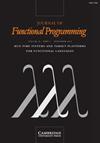Leibniz equality is isomorphic to Martin-Löf identity, parametrically
IF 1.1
3区 计算机科学
Q4 COMPUTER SCIENCE, SOFTWARE ENGINEERING
引用次数: 1
Abstract
Abstract Consider two widely used definitions of equality. That of Leibniz: one value equals another if any predicate that holds of the first holds of the second. And that of Martin-Löf: the type identifying one value with another is occupied if the two values are identical. The former dates back several centuries, while the latter is widely used in proof systems such as Agda and Coq. Here we show that the two definitions are isomorphic: we can convert any proof of Leibniz equality to one of Martin-Löf identity and vice versa, and each conversion followed by the other is the identity. One direction of the isomorphism depends crucially on values of the type corresponding to Leibniz equality satisfying functional extensionality and Reynolds’ notion of parametricity. The existence of the conversions is widely known (meaning that if one can prove one equality then one can prove the other), but that the two conversions form an isomorphism (internally) in the presence of parametricity and functional extensionality is, we believe, new. Our result is a special case of a more general relation that holds between inductive families and their Church encodings. Our proofs are given inside type theory, rather than meta-theoretically. Our paper is a literate Agda script.莱布尼茨等式同构于Martin-Löf恒等式,参数化
考虑两个广泛使用的相等定义。莱布尼茨的定理:如果一个谓词成立第一个谓词也成立第二个谓词,则一个值等于另一个值。还有Martin-Löf:如果两个值相同,则占用标识一个值与另一个值的类型。前者可以追溯到几个世纪以前,而后者则广泛用于Agda和Coq等证明系统。这里我们证明了这两个定义是同构的:我们可以将莱布尼茨等式的任何一个证明转换为Martin-Löf恒等式的一个证明,反之亦然,并且每次转换之后的另一个都是恒等式。同构的一个方向关键取决于与莱布尼茨等式相对应的类型值满足泛函扩张性和雷诺兹的参数概念。转换的存在性是众所周知的(意思是如果一个人能证明一个等式,那么他就能证明另一个),但我们认为,这两个转换在参数性和函数延展性的存在下(在内部)形成同构是新的。我们的结果是归纳族和它们的教会编码之间更一般关系的一个特例。我们的证明是在类型论内部给出的,而不是元理论。我们的纸是识字的阿格达文字。
本文章由计算机程序翻译,如有差异,请以英文原文为准。
求助全文
约1分钟内获得全文
求助全文
来源期刊

Journal of Functional Programming
工程技术-计算机:软件工程
CiteScore
1.70
自引率
0.00%
发文量
9
审稿时长
>12 weeks
期刊介绍:
Journal of Functional Programming is the only journal devoted solely to the design, implementation, and application of functional programming languages, spanning the range from mathematical theory to industrial practice. Topics covered include functional languages and extensions, implementation techniques, reasoning and proof, program transformation and synthesis, type systems, type theory, language-based security, memory management, parallelism and applications. The journal is of interest to computer scientists, software engineers, programming language researchers and mathematicians interested in the logical foundations of programming.
 求助内容:
求助内容: 应助结果提醒方式:
应助结果提醒方式:


